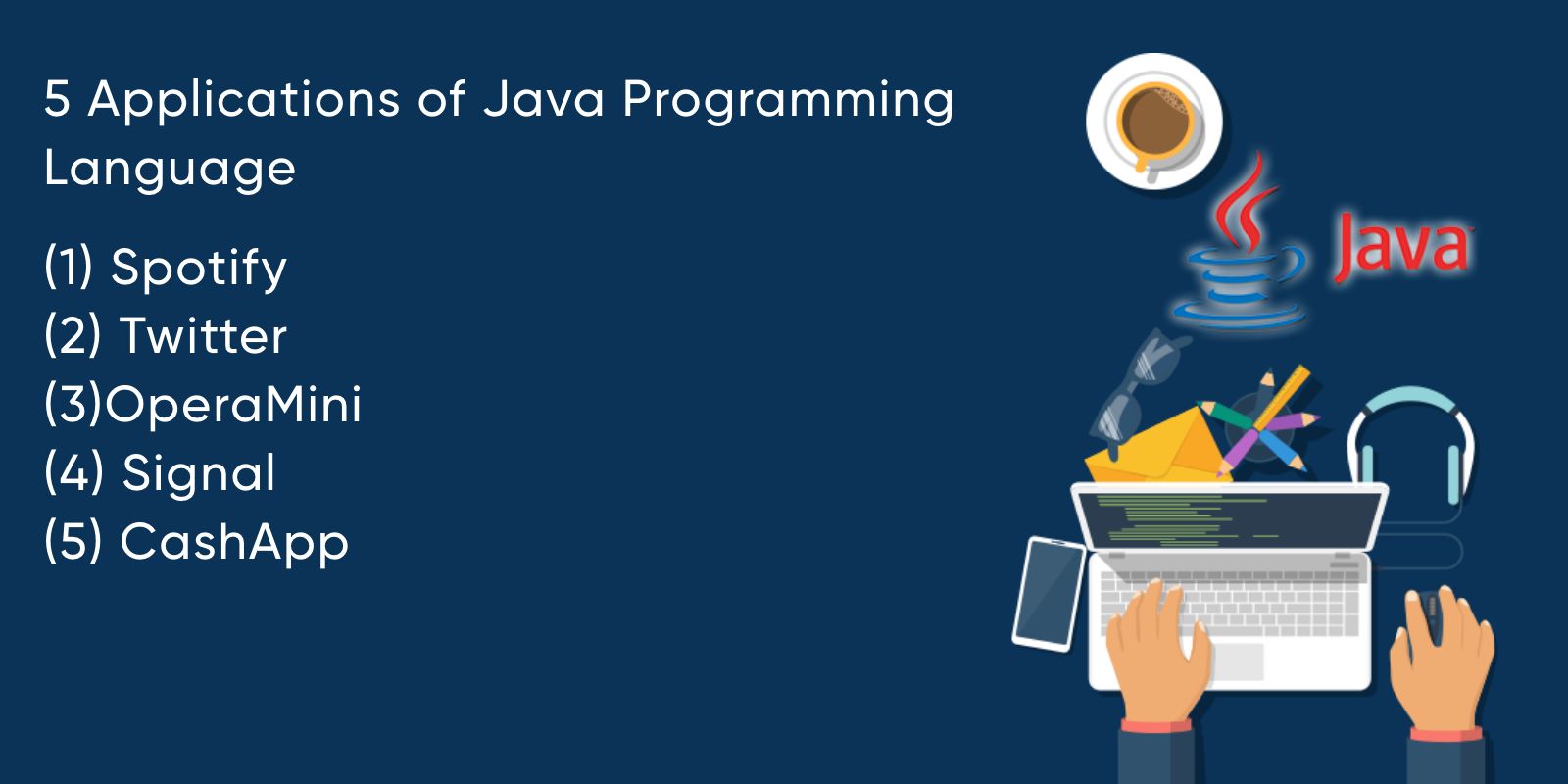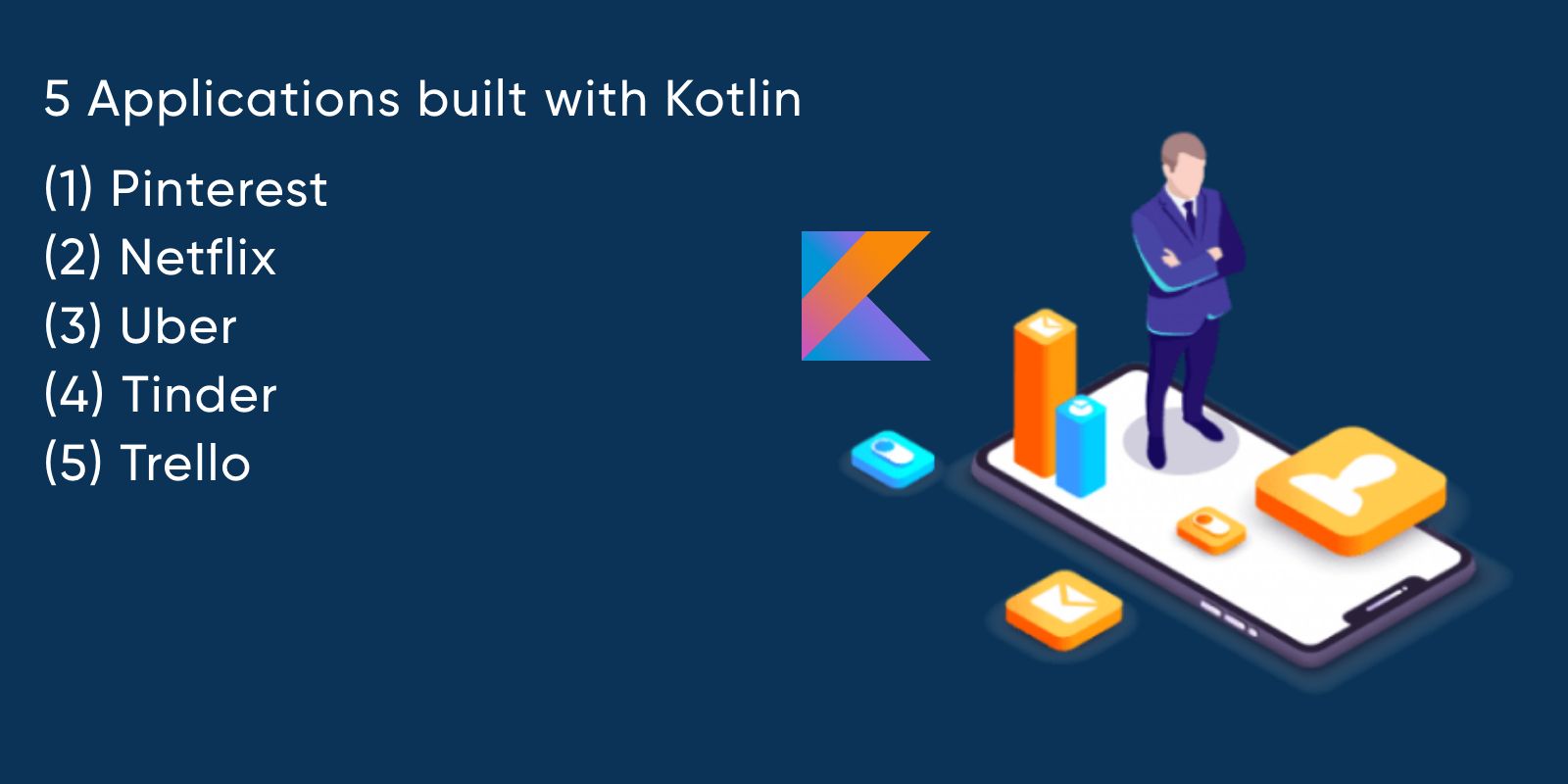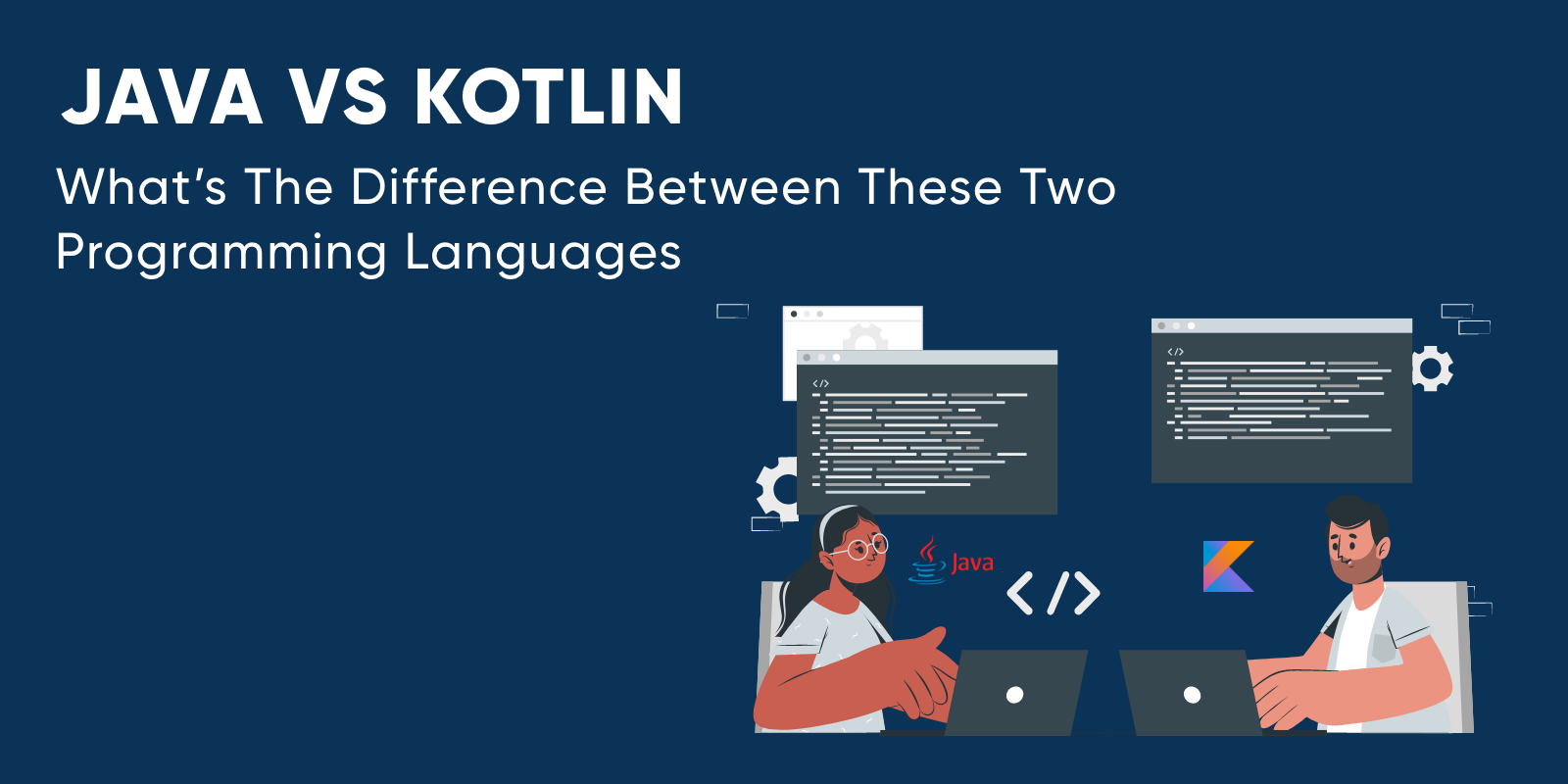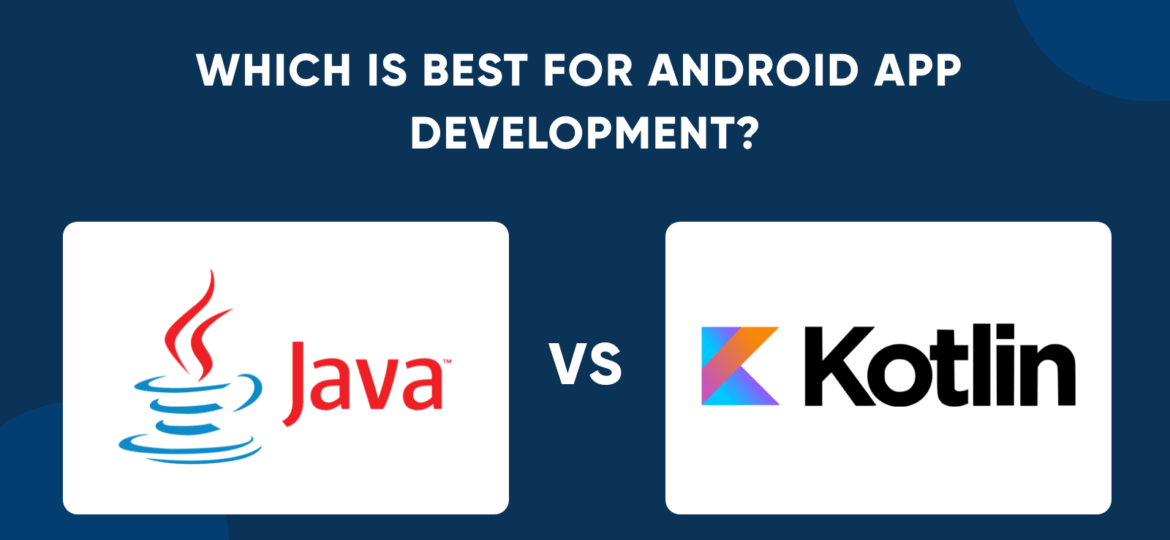The demand for Android app development is increasing day by day. This is because Android has become the most popular smartphone operating system in the world. As a matter of fact, due to this rise in demand, most businesses are thinking about developing a leading and impactful app but which programming language (Java Vs Kotlin) is the best?
Well, the first two technologies’ names that strike most of the experts are Java vs Kotlin if someone talks about developing an Android application. Moreover, Java Vs Kotlin are the most popular languages, both are outstanding, mainly known worldwide for their superior functionalities, features, and capability of developing a great Android application.
Obviously, multiple languages can’t be used to develop any mobile application. Therefore, let’s figure out which one will be the best among Java vs Kotlin. So, in this blog, we will cover everything from the introduction of the programming languages, their pros, and cons, to the differences between Java Vs Kotlin, and much more.
What Is Java?
Java is one of the oldest object-oriented, multi-platform programming languages. Java is one of the most extensively used languages in today’s date and reputable programming languages applied for Android development worldwide. Not to mention, as per the Developer Nation’s research, in the year 2020, Java reached over 8 million active software developers across the globe.
Java is a platform-independent language. On the other hand, the basis for the creation of Java was the WORA (Write Once, Run Anywhere) principle. Furthermore, that signifies once the Java code is compiled, it will work on almost any device, operating system, server, or platform that supports Java without the need to be recompiled.
Additionally, Java can be characterized as a scalable, secure, and robust programming language that can be applied to build a whole host of various desktop, enterprise, cloud-based, and web-based applications.
Benefits of programming in Java
Java offers a wide range of benefits of programming in Java to developers. Let’s have a look at the benefits:
Easy to learn
In comparison to various other popular programming languages available, Java is the easiest programming language to learn and understand. Java is a well-structured and object-oriented programming language and also uses an understandable syntax, which makes it so easy for beginners.
Platform-independent
The ability to write platform-independent code is one of the most vital benefits of Java. This means that developers can write code that will perform properly on various operating systems which will save programmers valuable time. Java is platform-independent as it uses a compiler to translate code. The compiler enables developers to convert Java source code to bytecode language which can be translated into the language that the system can understand. It translates source code into executable code.
Large community
Java is among the 10 most popular programming languages. It is quite evident that it has a large community of users behind it as it is the most stable programming language. This was first released in 1995 and has been maintained wonderfully by Oracle for the past two and a half decades. It is very easy to find help in case of support requirements or various resources are available online for learning the language.
Abundant API
Java provides a rich Application Programming Interface (API) that can be used by software developers to build integrations between different applications and make them communicate with each other.
Security
Java is loved by data privacy specialists as it has a range of built-in security features, including garbage collection, automatic memory management, configurable security levels, and range-checking on the array. All these security features result in lesser programming errors and make the code more secure and robust.
Challenges of the Java Language
The challenges of the Java language are listed below.
- The syntax that Java uses can be a little complicated or cumbersome in comparison to other languages – like C + or Python.
- With Java, it is impossible to access certain content that may be incompatible with the device or equipment being used.
- It isn’t easy to access the new Java enhancements in mobile development.
- There are times when Java causes problems with Android API design.
- Test-Driven Development for Java requires writing more code and carries a much higher risk of programming errors and bugs.
- Java is a bit slower with respect to other programming languages and takes a lot of system memory.
Top 5 Applications of Java Programming Language

Several mobile applications have been developed with Java in the past 25 years. So, let’s have a look at the list of top 5 Java mobile applications:
Spotify
Spotify is a Swedish-based audio streaming and service provider Java script application. In 2008, it was first launched by Daniel Ek and Martin Lorentzon. Spotify allows its users to source millions of songs and/or record labels, remotely, from just a smartphone or laptop. This outstanding Java mobile application is so unique and this music platform is loved by millions of people. Now it has become the king in the category of the best music streaming application.
Also Read:
Twitter is second on our list of top Java mobile applications. It is an American free social networking and micro-blogging service application that enables its registered users to broadcast short posts, messages, and shout- outs, etc., called Tweets. Twitter was first founded by Jack Dorsey, Noah Glass, Biz Stone, and Evan Williams in 2006. Registered users can themselves tweet and also like, dislike, follow and unfollow other registered users’ tweets as well. As of May 2020, This platform has 330 million users and 145 million daily active users with an average of 500 million tweets going viral every day. This explains the popularity of Twitter.
OperaMini
OperaMini is another application on our list of top 5 Java mobile applications. It’s a Norwegian mobile web browser that was initially released in 2005 with its mobile app development and programming language as Java majorly. OperaMini was initially designed for Opera Mobile, but to accommodate growing user demand it underwent Android App Development and now OperaMini is available exclusively for android as well. OperaMini works on mobile phones, smartphones, and personal digital assistants.
Signal
A Signal is an encrypted messaging service provider application of Java programming language that enables secured voice or video communication between two or more Signal users with standard cell phone numbers via IOS, android or desktop, by using end-to-end encryption technology. Users can share text, voice calls, video calls, images, and videos via the signal app.
CashApp
CashApp is a mobile payment service app developed by Square, Inc. in 2015 with the aim of providing money transfer service between any two cash app registered users using a smartphone. This Java mobile application can also be used by businesses with the ability for individuals, organizations, and business owners to use unique usernames in order to send and receive money via $cashtag functionality. Additionally, CashApp further extended its functionality by expanding itself to support BITCOIN trading as well in 2018. It has become one of the favorite Java mobile applications because of its unique functionalities.
What Is Kotlin?
Kotlin is a trending open-source programming language. It is a general-purpose programming language that targets Java Virtual Machine (JVM), JavaScript, Android, and Native.JetBrains developers were the first ones to bring in the Kotlin language. The main aim of developers behind developing Kotlin was to create a programming language that would cover Java’s drawbacks. The name of the language comes from Kotlin Island, located in the Gulf of Finland.
The language is inspired by a range of existing programming languages such as Java, JavaScript, Scala, C#, and Groovy. Nowadays, Kotlin is a concise, safe, pragmatic programming language that can be used almost everywhere and can be learned quickly by Java developers. Therefore, it is very much compatible with all existing Java frameworks. You can easily hire top Kotlin developers for your project.
The language is supported by all the leading Integrated Development Environments (IDEs), including Eclipse, NetBeans, Android Studio, and IntelliJ IDEA.
Easy to Adopt
If you want to facilitate the product maintenance or streamline Custom Android App Development, you can assign two or three engineers to move the project to Kotlin starting from a small part of the codebase.
Conciseness
In comparison to Java, the latter has proven to be more laconic and expressive. Kotlin enables developers to solve the same issue by writing less code. As a result, it improves code readability, leaves less space for errors, and makes the code more efficient.
Interoperability
Kotlin can boast full interoperability with Java. It is 100% compatible with the ecosystem of Java frameworks, tools, and libraries. Additionally, it can couple with Gradle and Maven build systems.
Programmers can write new modules in Kotlin without doubting whether they will work with the existing Java code. All of that makes Kotlin an easy-to-learn-and-use language for Android developers that were previously using Java to build their apps.
Vibrant community
Well, Kotlin is a quite young programming language, yet it has a strong and supportive community of programmers that stand behind it. All interested developers can benefit from the constantly growing number of open-source projects published on GitHub. One can find a range of learning resources, courses, blogs, videos, and tutorials to learn the language.
Safety
The Kotlin language eliminates a significant number of coding errors that may become the reason for system crashes and failures. Due to its simplified framework, it requires developers to write fewer lines of code, which eventually means fewer coding errors. Apart from that, the language performs a range of different checks that enable the detection of bugs early.
Challenges of the Kotlin Language
The challenges of the Kotlin language are:
- Kotlin is not so popular, and so the developer community is sparse compared to other well-established languages like Java.
- Kotlin matches weak patterns, and initial code readability becomes a bit difficult to read and understand at first.
- It has a small support community as Kotlin is younger than Java. Moreover, it has fewer libraries, blog posts, and tutorials.
- Kotlin has a steep learning curve, and switching teams to Kotlin because of the language’s concise syntax can be a real challenge.
- There are very few Kotlin developers available in the market. So, finding an experienced mentor is quite tricky.
Top 5 Applications built with Kotlin

Kotlin has become the fastest-growing programming language. So, let’s see which apps are using it:
Android engineers at Pinterest loved working with Kotlin programming language as it enables them to write simple, quick, and accurate code. Pinterest is one of the most popular images sharing applications which has gained traction giving great results to the end-user. They successfully migrated from Java to Kotlin and after understanding the advantages offered by Kotlin, it has become their primary language of development.
Netflix
Netflix is among the most popular applications today. This online streaming platform stretching across 190 countries has recently revised and rebuilt its UI Player fully on Kotlin. And they can’t thank Google better for the blessing that it brought to their overall visual experience.
Uber
Uber is one of the leading applications and services in the commutation market. It has also significantly invested in Kotlin for enhancing its tooling processes which include annotation and Gradle plugins. Kotlin is generally for writing build scripts in the case of Uber’s Gradle.
Tinder
Tinder has become one of the trending apps which connect people for dating. The app has revolutionized its production environment with Kotlin. This app has achieved concise and clear code architecture with the potential of Kotlin application deployment.
Trello
Trello is one of the leading applications that have won the hearts of millions of large companies. It is used to organize projects via boards. This platform is appreciated for streamlining workflows and boosting the company’s productivity and efficiency. Trello switched from Java to Kotlin because of the interoperability reason with Java. Trello has only Kotlinized its android application while the rest of the code remains in Java.
Java Vs Kotlin: What’s The Difference Between These Two Programming Languages

Comparisons Between Java Vs Kotlin
| Features | Java | Kotlin |
|---|---|---|
| Functional Programming | Java is more limited to the concept of object-oriented programming. | Kotlin is a mix of object-oriented and functional programming. It can use lambda expressions and high-order functions. |
| Checked Exceptions | Java developers have checked exceptions support. | Checked exceptions are not available on Kotlin. Thus, Kotlin’s developers do not require catching or declaring exceptions. |
| Extension Functions | To extend the functionality of an existing class, we need to create a new class and inherit the functions from the parent class. | Kotlin enables the developer to extend the functionality of classes without necessarily having to inherit from a class. |
| Wildcard Types | Java provides wildcards. | Kotlin does not provide wildcards. |
| Data Classes | Developers need to establish the fields (or variables) to store the data, the constructor, and the getter and setter functions for the fields/variables, as well as other functions, such as the hashCode(), equals(), and toString(). | Kotlin provides a more straightforward way to create classes to hold data by simply including the “data” keyword in the class definition. |
| Public Fields | Public fields (also known as non-private fields) are available in Java. | Kotlin does not have public fields. |
| Smart Casts | The developer must check the variables’ type in consonance to the operation. | Casting checks are handled by the smart casts feature. Kotlin’s intelligent compiler automatically manages redundant casts. |
| Null Safety | NullPointerExceptions – enables developers to attribute a null value to any variable. | In Kotlin it is not possible to attribute null values to variables or objects by default. |
| Code | Requires more lines of code than Kotlin. | Typically requires less code and is a very concise language. |
Functional Programming
As we know, Kotlin is a mix of object-oriented and functional programming.
Functional programming is a declarative style of programming that handles computations based on mathematical functions. High-order functions and lambda expressions are (some) functional programming concepts.
Kotlin is a statically typed language and can make the most out of various function types to represent functions. Or, it is possible to operate functions in a variety of ways.
Also, it is also possible to use lambda expressions or anonymous functions with Kotlin. These are a “functional literal”. Therefore, it represents a non-declarable function and immediately passes as an expression.
Whereas Java is more limited to the concept of object-oriented programming. However, it has been taking some steps toward functional programming too. Since Java 8, in 2014, Java has introduced lambda expressions, which is a function that can be created without necessarily belonging to a class. In fact, lambda expressions in Java qualify as objects and can be executed on demand.
Further, with the introduction of lambda expressions, Java also started supporting high-order functions. Java associates a function with a method, and Java 8 enables lambda’s return from methods.
Checked Exceptions
In Kotlin, we don’t have checked exceptions. So, Kotlin’s developers don’t need to catch or declare the exceptions which have advantages and disadvantages.
In Java, we have checked exceptions support which makes developers declare and catch the exception. It ensures robust code with good error handling. Therefore, checked exceptions support has its pros and cons.
Extension Functions
Kotlin allows developers to extend an existing class with new functionality. To perform the extension function in Kotlin, the developer must prefix the name of the class (that will be extended) to the name of the function created by using the ‘.’ notation.
In Java, if we want to extend the functionality of the existing class, we need to create a new class and inherit the parent class. So, the Extension function is not available in Java.
Wildcard Types
Typically, a question mark (?) in code is a wildcard, which suggests an unknown type (of variable, field, or parameter).
Unlike Java Vs Kotlin does not provide wildcards. Instead, it has a declaration-site variance and type projections, which serve as an alternative.
Primitive types
In Java, variables of a primitive type are not objects; they are Java’s data types that are predefine. Java has 8 different primitive data types: int, byte, short, double, float, boolean, char, and long. Consequently, these variables cannot be an object that is from a struct or a class.
Even though primitive types are not classes, Java developers can use classes that can wrap a value of the primitive type. To do so using Java, the developer must indicate it explicitly.
Whereas, in Kotlin, as soon as you initiate a variable of a primitive type, it will automatically become an object.
Data Classes
In Java, suppose we need to have a class that needs to hold data but nothing else. For this we need to define constructors, variables to store data, getter and setter methods, hashcode(), toString(), and equals() functions.
On the other hand, in Kotlin, if we need to have classes that need to hold data, we can declare a class with the keyword “data” in the class definition then the compiler will take care of all of this work, such as creating constructors getter, setter methods for different fields.
Public Fields
Public fields (also known as non-private fields) are available in Java. They can be pretty convenient in case the callers of an object require modifying according to the representation of that same object since it enables the developer to change the representation of an object without needing to adjust the callers. This way, the fields can be public; therefore, the public API remains unchanged, and the program can sustain a level of maintainability.
Contrastingly, Kotlin does not have public fields.
Smart Casts
In Java, We need to check the type of variables and cast them according to our operation. On the other hand in Kotlin, smart casts will handle these casting checks with the keyword “is-checks”, which will check for immutable values and perform implicit casting.
Null Safety
In Java, NullPointerExceptions cause huge frustration for developers. It allows users to assign null to any variables, but while accessing an object reference having a null value raises a null pointer exception which the user needs to handle.
In contrast, in Kotlin, by default, all types of variables are non-nullable (i.e. we can’t assign null values to any type of variables/objects). If we try to assign or return null values, the Kotlin code will fail during compile time. If we really want a variable to have a null value, we can declare it as follows:
value num: Int? = null
Code
One of the key differences between Kotlin and Java is that Kotlin requires way less code. It is a very concise language, which reduces the chances of making code errors and simplifies the developers’ work.
Overall, Kotlin’s brevity makes it more manageable to write large projects considering that it typically requires fewer lines of code than Java to write the exact same functions. Also, it knows how to keep it short and straight to the point without compromising syntax’s readability.
In Conclusion
For Java Vs Kotlin, Kotlin seems to be the best option at present. Most of the companies and developers are adopting it, and the programming language will most likely continue to grow.
However, Java remains an excellent general-purpose language. Also, it has been Android’s favorite for so long, so the replacement is not that easy.
This is an overview of the comparison between Java vs Kotlin and which language is better is not that straightforward. Also, there are several aspects to consider other than only the languages’ differences, for example, which language the companies are using and how comfortable developers feel with Java Vs Kotlin and more. Therefore, you can go with any of these top-notch programming languages depending on your requirements, and Echoinnovate IT can help you with that. Get in touch with us today!
FAQs
Which is better for Android development – Java or Kotlin?
Kotlin is the preferred language for Android development in 2023. Both Java and Kotlin can be used to build performant, useful applications, but Google’s libraries, tooling, documentation, and learning resources continue to embrace a Kotlin-first approach; making it the better language for Android today.
Is Java still popular for Android development?
Yes, absolutely. Moreover, the majority of Android apps today have some mix of both Java and Kotlin code. Developers can build the same functionality with Java as they can with Kotlin.
Is Kotlin easier than Java?
Many will find Kotlin easier to learn and write than Java. A number of things factor into this experience including Kotlin’s concise syntax, type inference, explicit nullability, and extensive standard library.



